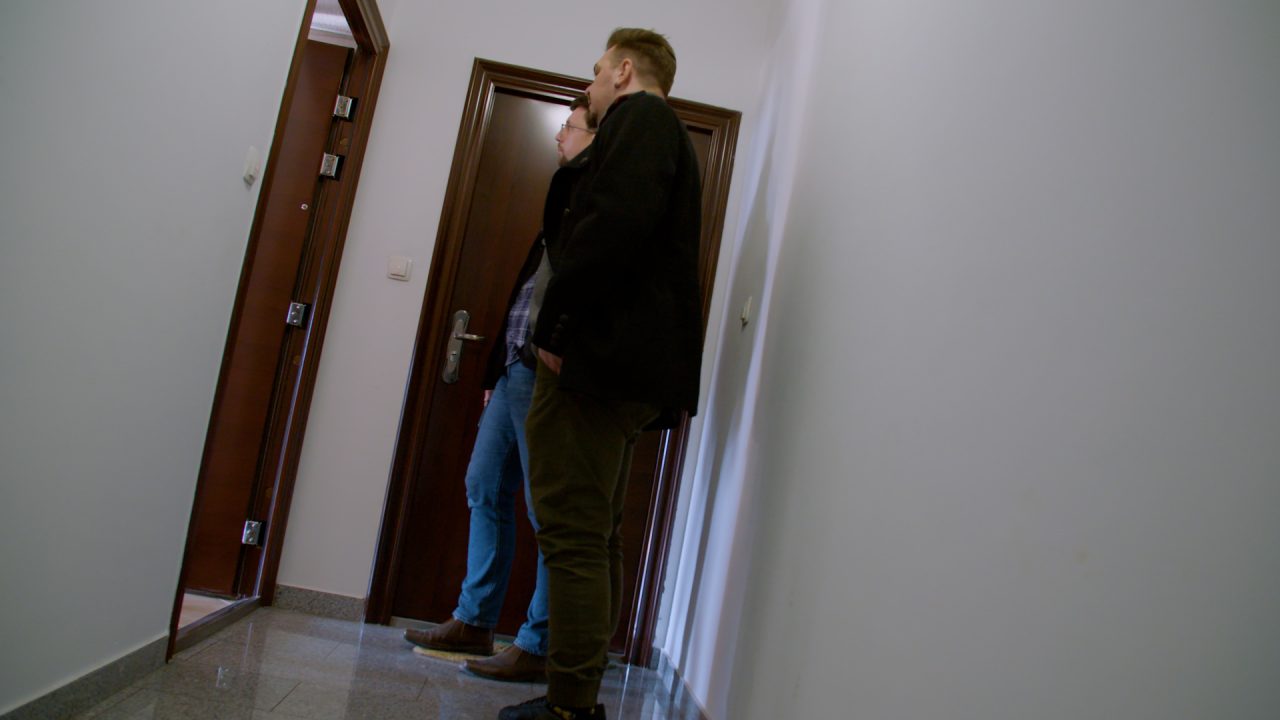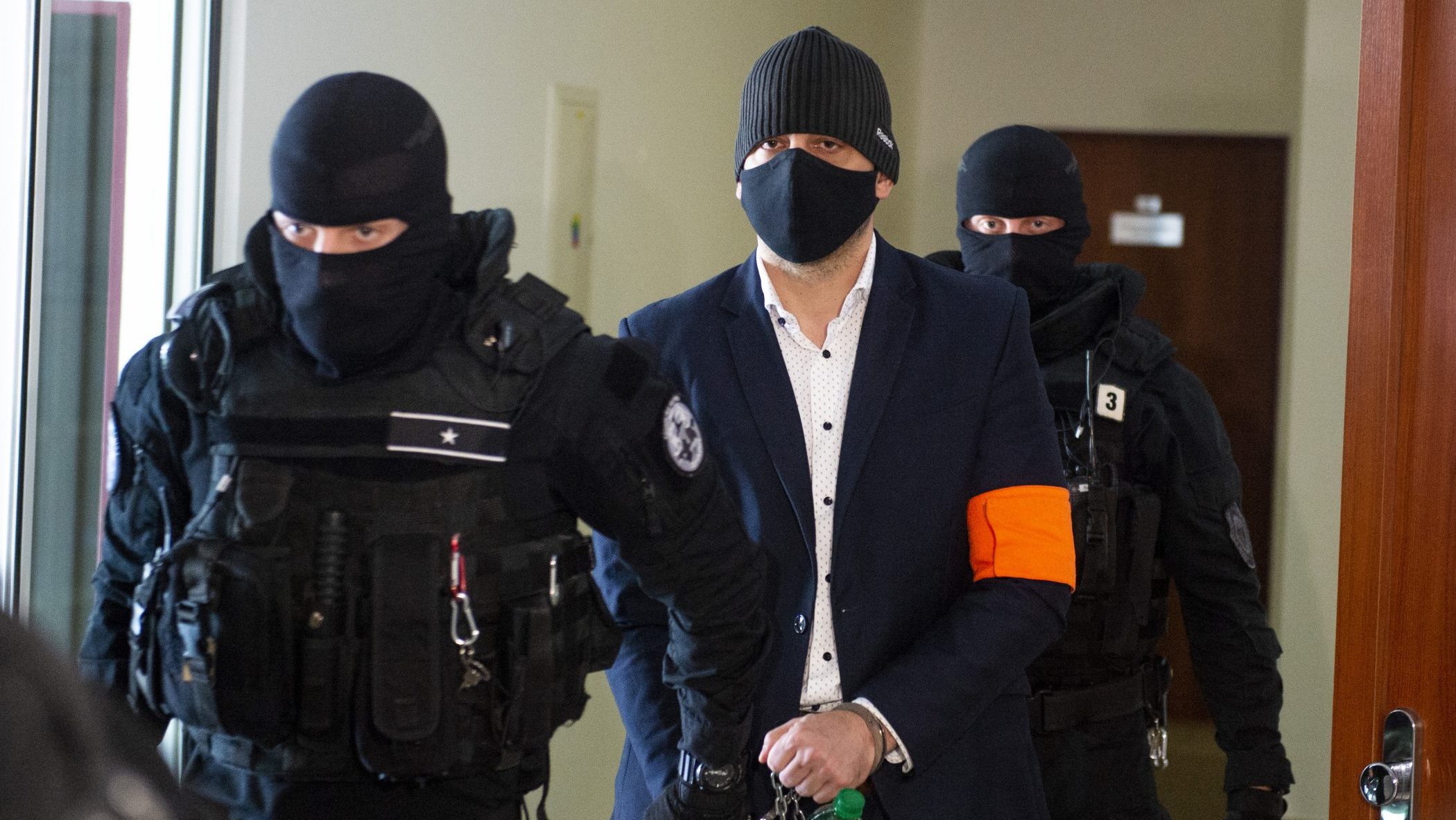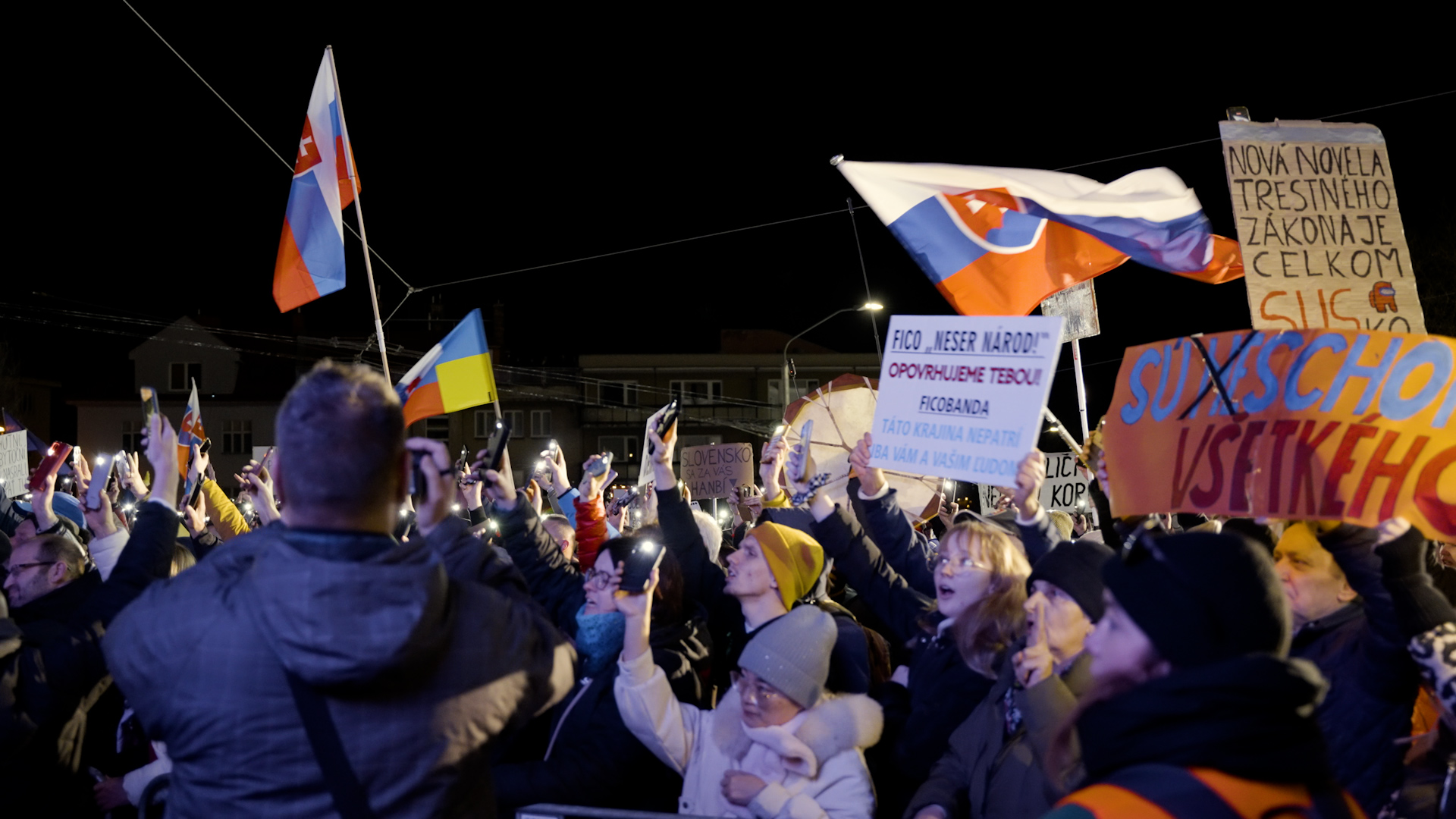This post is also available in: Bosnian
Building tenants and workers from nearby companies who spoke to the journalists expressed curiousity about their new neighbour as they don’t often see many visitors from Slovakia, but said they still have not met the car owner. “I saw that the Skoda appeared a month or two ago, but I don’t know who it is,” said one tenant.
The sunny February days did not tempt Gasparovic out for a walk in Mostar during the three days that BIRN and ICJK journalists spent waiting for him in front of the building to ask how he was getting by, as well as why he decided to come to Mostar after being given a prison term and ordered to pay a fine of 20,000 euros in a final judgement handed down by the Supreme Court of Slovakia.
Yet Gasparovic didn’t leave the apartment on the third floor of the building that lies in the vicinity of Bosnia’s State Investigation and Protection Agency, SIPA, and the Security and Intelligence Agency, OSA. Tenants started to disapprove of the journalists monitoring their neighbourhood, asking who they were looking for and why. After receiving an explanation, they would pull away. Some of the tenants called the police, who questioned the BIRN crew.
By then, the journalists had already visited dozens of apartments in the building before a greyish-bearded man with black hair in his 40s, whose appearance matched Gasparovic’s photo on the Slovak police warrant issued in December 2023 after he had already arrived in Bosnia, greeted them at the door of an apartment on the third floor.
“Dobry den, Pan Gasparovic,” one of the ICJK journalists greeted him in Slovak, whereupon his smile disappeared from his face and he muttered a reply before shutting the door. The journalists then tried to deliver a few questions through the closed door, but there was no response.
Based on other unofficial confirmation from at least two security sources – BIRN’s security source first confirmed the former counter-intelligence chief had entered Bosnia in a Skoda vehicle in late November, and another independent security source confirmed that Gasparovic had taken up residence in Mostar – and the encounter at the door, BIRN and ICJK can confirm that Gasparovic now resides in Mostar.
Two weeks after confronting Gasparovic at his apartment, BIRN journalists visited the address again, but they no longer saw the car with the Slovak license plates and no one answered the door at the apartment.
Growing community
 Journalists in front of the door of the apartment where they found Peter Gašparovič. Photo: Detektor
Journalists in front of the door of the apartment where they found Peter Gašparovič. Photo: Detektor
The long-time journalist with the Slovak website Aktuality, Jan Petrovic, explains how Gasparovic got involved in a since-uncovered criminal network in Slovakia while holding a high-ranking position in the SIS.
“He is a former chief of the Counter Intelligence Service with the SIS during rule of Robert Fico and is one of the high-ranking members of the state security forces, who actually ended up in a network of investigations launched after the , when it was said that the police in Slovakia were given a free hand and could investigate crimes reaching high circles, be it in the security forces or in politics,” Petrovic explains.
Gasparovic is the third former Slovak security official whom BIRN and ICJK journalists have discovered living in Bosnia; Marian Kucerka and Jan Kalavsky, high-ranking officers of the Slovak National Crime Agency, NAKA, arrived previously, also escaping prison sentences. The former was sentenced in a final judgement by a Slovak court and the latter in a first instance court for their involvement in corruption cases and abuse of office.
Petrovic’s colleague in the newsroom, Laura Kello Kalinska, who has followed those cases over a long period of time, says it is important to check, as soon as possible, what money those people are living on while in Bosnia. She mentioned in particular the case of Kalavsky, who said during his trial that he had no money and was living on “gifts” identified as bribes by investigators, but now apparently owns a house with a pool in the town of Trebinje in Bosnia’s Republika Srpska.
“I don’t think it is dangerous if they come back to Slovakia, but on the contrary, it is dangerous if they stay in foreign countries and create new networks while we don’t know who actually pays them, where they get the money from, what they live on and how they work… We should think about whether the authorities, foreign or Slovak, should check what those men actually live on and, in case they cannot prove that, they should go back to Slovakia and answer questions from local authorities,” she argues.
The arrival of Slovak fugitives to Bosnia already poses a security challenge, believes Veldin Kadic of the Security and Peace Studies Department at the Faculty of Political Sciences in Sarajevo. He explains it is unlikely that they want to undermine security in Bosnia, but regardless, there is a need for caution considering their background as well as the controversies surrounding their stay, way of life, and acquisition of money and assets.
While the presence of fugitives from Slovakia will not escalate into a security threat anytime soon, Kadic explains, such cases require the authorities in Bosnia to increase supervision, and speed up, simplify and tighten the asylum procedures in such and similar cases.
“If, for any reason, Bosnia approaches this problem indifferently, thus becoming a safe haven for fugitives from other European countries too, it will not only damage our international reputation in the long run, but could also bear the potential risk of growing into some sort of a security threat,” Kadic says.
Who is Peter Gasparovic?
 Peter Gašparovič in the building of the Special Court of Slovakia. Photo: TASR – Jakub Kotian
Peter Gašparovič in the building of the Special Court of Slovakia. Photo: TASR – Jakub Kotian
Gasparovic, a 43-year-old from Pezinok near Bratislava, was sentenced to a prison term and fined in Slovakia after getting involved in a corruption scheme involving a Slovak businessman, who paid to make his troubles with the tax administration disappear.
The former head of the SIS’s Counter Intelligence Department found himself in the dock in 2020 following the murder of investigative journalist Jan Kuciak and his fiancé Martina Kusnirova, which revealed high-level corruption and criminal dealings among senior police, tax administration and SIS officials.
A significant number of cases were uncovered during one of several large-scale operations codenamed Judas, in which former police head Milan Lucansky was arrested, though he subsequently committed suicide while in detention.
The case that led to Gasparovic’s sentencing started in 2018, when he was originally accused of blackmailing the owner of a private company. The businessman encountered problems with tax investigators that eventually led to his company’s bankruptcy.
Prior to the bankruptcy, the Tax Administration of the Republic of Slovakia froze the assets of the company, after which the owner met with several influential people who gave him instructions on how to unfreeze those assets. One of the meetings took place, curiously, in a sauna of a hotel near Bratislava, where he met with two members of the SIS, one of whom was Gasparovic.
The two intelligence officials told the businessman that if he wanted his problems to disappear, he should pay them at least 350,000 euros, and that he would get the money back through an illegal tax refund if he complied. As stated in the judgement, the businessman paid 200,000 euros, which people from the Tax Administration shared with Gasparovic and the other intelligence official, but the businessman later reported the affair to the Slovak police and the case eventually ended up in court.
The indictment against Gasparovic laid out how, following the murder of the journalist Kuciak and discovery of numerous scandals, the police managed to shed light on the affair for which Gasparovic was arrested.
The case was initially investigated as extortion, but charges against gasparovic were later changed to crime of accepting bribes. For this crime, a first instance verdict was delivered by the Special Court a year later, and he was found guilty of direct corruption and sentenced to 11 years in prison and a fine of 50,000 euros.
Following his appeal against the verdict, the Slovak Supreme Court delivered a second instance verdict in March 2022, deciding that the offences for which Gasparovic had been convicted should be reclassified as indirect corruption, for which much lower sentences applied. Under that decision, Gasparovic was sentenced to 22 months in prison and the fine reduced to 20,000 euros.
As Gasparovic had been held in custody since his arrest in December 2020, under the decision from August 2022 he was released on parole, because he had already served two-thirds of his sentence.
After the Office of the Special Prosecutor had appealed the second instance verdict and Gasparovic failed to appear at subsequent hearings, the Supreme Court issued an arrest warrant against him on December 14, 2023. A search by the Slovak police and Interpol determined that he had arrived in Bosnia already in late November and was no longer available to the Slovak judicial bodies, for which reason the court decided, on January 17 this year, to treat him as a fugitive.
Only a day after the said court’s decision, Gasparovic gave written consent through his attorney for the appeal to be decided upon in his absence, which meant he was eventually not treated as a fugitive. The court even decided to cancel the arrest warrant, since by giving his consent to act in his absence he was no longer obstructing justice. However, the court then decided to uphold the prosecution’s appeal, meaning Gasparovic faces new proceedings.
In this renewal of the second instance process, Gasparovic once again faces the possibility of a long prison sentence, as was originally proposed by the Specialised Criminal Court. However, the length of that sentence could be greatly influenced by new political developments in the country.
A change of climate at home
 Protests in Bratislava against the new criminal law. Photo: Detektor
Protests in Bratislava against the new criminal law. Photo: Detektor
Meanwhile, the return of Robert Fico and his Smer party to power at the end of last year has changed the calculus back at home for people like Gasparovic.
Fico was prime minister during the time leading up to Kuciak’s murder in 2018 and was forced out of office after mass street protests following the journalist’s murder and subsequent revelations about the corrupt networks that had established themselves during his six years in power.
With so many Smer allies coming under investigation during the previous governments, upon his return to power in 2023 Fico has moved to make changes to the Penal Code that, among other things, will reduce penalties for serious crimes and close down the Special Prosecutor’s Office, responsible for investigating high-level corruption.
According to Katarina Batkova, executive director of the Bratislava-based legal organisation VIA IURIS, the amendments to the criminal code will result in the reduction of penalties for corruption and statute of limitations for investigations in such cases, which could eventually lead to persons suspected in those cases not ending up in court and not being punished.
The new law provides for persons involved in corruption cases worth less than 250,000 euros to receive a penalty of imprisonment lasting up to four years. “The court can decide that for this convicted person, under four years of punishment in prison, the sentence can be postponed. And there will be a probation period decided by the court. So, basically, if it is a first crime, then the convicted person will not go to jail and probably will end up on probation for a maximum of four years,” Batkova says.
Such an amendment, according to Maria Kolikova, justice minister in the previous government, would change the status of persons who were previously sentenced for corruption, such as Gasparovic, and affect future investigations into similar cases.
The political opposition in Slovakia has called the changes to the criminal code “a pro-mafia package” and are fighting to prevent them coming into effect on March 15.
Until this amendment is fully realised, people like Gasparovic have found a peaceful port in Bosnia, where lengthy asylum procedures enable them to simply wait out the period until their sentences are reduced, after which they can return to their homeland.
“It’s a little hard to believe that people who know each other and are facing the same problem in their home countries have accidentally chosen Bosnia as a place for potential refuge,” says Kadic of the Security and Peace Studies Department at the Faculty of Political Sciences in Sarajevo.
“Either they count on the complicated arrangements in Bosnia and at times vague and slow procedures to work for them in legal entanglements regarding their potential extradition; or, through their private political connections, they count on a delay of the process and eventual protection,” he says. “I wouldn’t rule out the last of those.”


